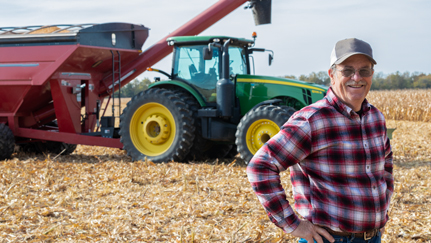Retirement isn’t often part of the long-term plan for farmers. But it’s still important to think about your long-term financial future. And a few retirement benefits are key components of that future.
That includes Social Security and Medicare. Incorporating these benefits into your long-term plans can help firm up your (and your farm’s) financial footing today and down the road.
“Farmers need a trusted advisor to help them understand how decisions around Social Security and Medicare will impact their finances,” said Nationwide Advanced Consulting Group Director George Schein. “Farmers need expertise to help transition their farms to the next generation. And they need to create a source of retirement income.”
Know the impacts of your Social Security choices
Social Security retirement benefits are available starting at age 62. But taking your benefit as soon as possible leads to reduced monthly payments. For that reason, many choose to delay until full retirement age or age 70 (when benefits stop growing).
Delaying benefits as long as you can is a good rule of thumb. But that’s not always best for farmers.
“Some farmers may not expect to live into their 80s. Those farmers are more likely to choose the reduced payments that begin before their full retirement age,” Schein said. “Some farmers may also start Social Security benefits early because they plan to rely on the steady source of income it provides to cover the costs of Medicare premiums, which generally start at age 65.”
It’s a good idea to talk to a financial professional as early as your 40s or 50s to ensure you qualify for benefits. You need at least ten years of taxable income to be eligible.
“A downside of today’s tax laws for farmers is that some may offset their farm’s annual income entirely and miss out on Social Security altogether,” Schein said. “By addressing this while there’s still time, a farmer can make the most of this important benefit.”
Learn more about Social Security disability for farmers from Nationwide’s Land As Your Legacy® team or get connected to a financial professional who can provide even more personalized guidance.
Plan for Medicare coverage
Most U.S. citizens become eligible for Medicare at age 65 if they’re either qualified to collect Social Security benefits, a U.S. citizen or if they’ve been a permanent resident for at least five years. With a few limitations, the federal program covers a portion of many common medical expenses like:
- Inpatient care
- Outpatient care
- Skilled nursing care
- Hospice care
- Durable medical equipment (like a walker or wheelchair)
- Preventative benefits like annual checkups and screenings
But there are also exclusions, namely:
- Prescription drugs
- Dental
- Vision
- Hearing care
Plan ahead to help better afford Medicare’s gaps
Additional coverage is available from private insurers and should be considered by those 65 and older. The annual open enrollment window is the key time for these decisions. It begins in mid-October and runs through early December.
“Planning for current and future medical care and how to pay for it is even more critical for farmers because of the physical nature of their work and a lack of quality health care in many rural areas,” Schein said.
Nationwide’s Land As Your Legacy team can help further make sense of both Medicare and Social Security for farmers. Watch their on-demand webinars to learn more.
